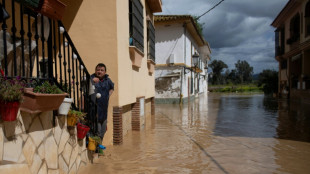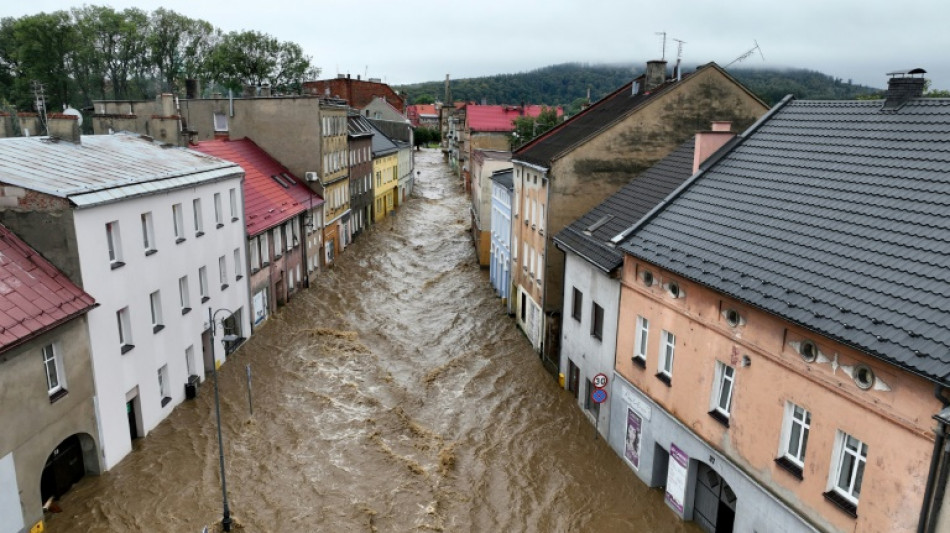
-
 Volkswagen says first-quarter profits impacted by Trump tariffs
Volkswagen says first-quarter profits impacted by Trump tariffs
-
Hope fades as deaths mount in Dominican Republic nightclub disaster

-
 Herd of animal puppets treks from Africa to Europe in climate action
Herd of animal puppets treks from Africa to Europe in climate action
-
'Versatile' Sudharsan helps Gujarat to top of IPL table

-
 Israel says seizing 'large areas' of Gaza as strike kills 23
Israel says seizing 'large areas' of Gaza as strike kills 23
-
Trump stuns with tariffs reversal but hits China harder

-
 Amazon to launch first batch of satellites rivaling Musk
Amazon to launch first batch of satellites rivaling Musk
-
Sudharsan, Krishna lead Gujarat to top of IPL table

-
 Settlement champion Huckabee confirmed as US Israel envoy
Settlement champion Huckabee confirmed as US Israel envoy
-
Trump pauses tariffs for 90 days but hits China harder

-
 US federal judges halt deportations of Venezuelans under wartime law
US federal judges halt deportations of Venezuelans under wartime law
-
No direct LIV path to Masters but Ridley wants one elite tour

-
 UK cinemas fight viral 'chicken jockey' trend
UK cinemas fight viral 'chicken jockey' trend
-
Russia denounces brief detention of government employee in France

-
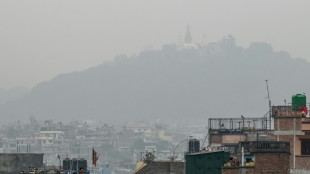 Nepal fights wildfires and pollution amidst drier winter
Nepal fights wildfires and pollution amidst drier winter
-
Jamaican speed merchant Thompson seeks fast progress in 2025

-
 'Horrible' Djokovic falls in Monte Carlo, first win for Alcaraz
'Horrible' Djokovic falls in Monte Carlo, first win for Alcaraz
-
Masters chief defends Cabrera invite after domestic violence convictions

-
 Pentagon chief in Panama vows to counter China 'threat'
Pentagon chief in Panama vows to counter China 'threat'
-
Trump's NASA chief pick says will 'prioritize' Mars mission

-
 Europe's first Universal theme park to bring 'joy to Britain': PM
Europe's first Universal theme park to bring 'joy to Britain': PM
-
Trump tells US to 'be cool' as China, EU strike back

-
 Djokovic crashes out in Monte Carlo, first win for Alcaraz
Djokovic crashes out in Monte Carlo, first win for Alcaraz
-
Over 120 dead in Dominican Republic nightclub disaster

-
 Delta to trim capacity in light of weakening travel demand
Delta to trim capacity in light of weakening travel demand
-
Pressure builds on Afghans fearing arrest in Pakistan
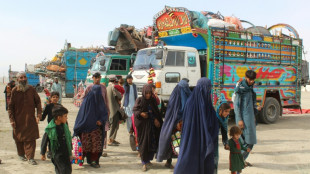
-
 From Freddy Kruegers to Peaky Blinders: a look at Ecuador's drug gangs
From Freddy Kruegers to Peaky Blinders: a look at Ecuador's drug gangs
-
Postecoglou says 'general sentiment' points to Spurs exit

-
 French group gets death threats over renaming of 'Negresse' district
French group gets death threats over renaming of 'Negresse' district
-
Beijing rejects Ukraine claim 'many' Chinese fighting for Russia

-
 Germany 'back on track' says Merz, unveiling new coalition
Germany 'back on track' says Merz, unveiling new coalition
-
France struggles to find new home for two orcas after park closes
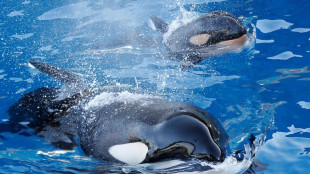
-
 Alcaraz recovers from sluggish start to move into Monte Carlo last 16
Alcaraz recovers from sluggish start to move into Monte Carlo last 16
-
Trump trade war escalates as China, EU counterattack

-
 Stocks volatile, oil plunges as trade war cranks higher
Stocks volatile, oil plunges as trade war cranks higher
-
US Treasury chief defends tariffs, warns against aligning with China

-
 Beijing consumers mull spending habits as 'worrying' tariffs kick in
Beijing consumers mull spending habits as 'worrying' tariffs kick in
-
Stocks, oil plunge as US, China crank up trade war

-
 Onana 'one of worst goalkeepers in Man Utd's history': Matic
Onana 'one of worst goalkeepers in Man Utd's history': Matic
-
Tata Steel to cut jobs at Dutch plant by 15%

-
 Tata Steel to cut jobs at Dutch plant by 15 pct
Tata Steel to cut jobs at Dutch plant by 15 pct
-
Ex-Italy World Cup winner Cannavaro sacked as Dinamo Zagreb coach

-
 'Curve ball': Irish whiskey producers fret over US tariffs
'Curve ball': Irish whiskey producers fret over US tariffs
-
Trade war escalates as China hits US with huge tariff

-
 Trade war escalates as China hit US with huge tariff
Trade war escalates as China hit US with huge tariff
-
China hawk Peter Navarro has Trump's ear

-
 How tariffs in the EU work
How tariffs in the EU work
-
Gaza rescuers say 23 killed in Israel strike on residential block

-
 'Catastrophe': Volkswagen town rattled by Trump trade war
'Catastrophe': Volkswagen town rattled by Trump trade war
-
Premier League claims fifth Champions League spot


Hurricanes, storms, typhoons... Is September wetter than usual?
With typhoon Yagi battering Asia, storm Boris drenching parts of Europe, extreme flooding in the Sahel and hurricane Helene racing towards Florida, September so far has been a very wet month.
But while scientists can link some extreme weather events directly to human-caused global warming, it remains too early to draw clear conclusions about this sodden month.
"You will always have some sort of extreme weather events, but their intensity has been magnified by global warming, especially in the context of rainfall," Paulo Ceppi from Imperial College London's Grantham Institute told AFP on Thursday.
"That's probably one of the common drivers of these different events in very different parts of the world."
Early indications from monthly data show some record-breaking precipitation levels in the regions affected.
In central Europe, the torrential rains accompanying storm Boris were "the heaviest ever recorded" in the region, according to the World Weather Attribution (WWA) network of scientists, inundating homes and farmland.
Global warming has doubled the likelihood of severe four-day downpours since the pre-industrial era and the costs of climate change are "accelerating", WWA said in a report published Wednesday.
Meanwhile in Japan's city of Wajima, more than 120 millimetres (4.7 inches) of rainfall per hour from typhoon Yagi was recorded on the morning of September 21 -- the heaviest rain since comparative data became available in 1929.
- Hotter, and wetter? -
"Attributing different weather patterns around the world at the same time to climate change is very challenging," said Liz Stephens, science lead at the Red Cross Red Crescent Climate Centre.
"But the fundamental principle remains that for every 1 degree Celsius of warming the atmosphere can hold seven percent more moisture," she told AFP.
With global warming on track to exceed 1.5 degrees Celsius above pre-industrial times "you can do the math pretty quickly and that will have a measurable impact," said Ceppi from the Grantham Institute.
The 2024 northern summer saw the highest global temperatures ever recorded, beating last year's record, according to the EU's climate monitor Copernicus.
A hotter planet, in other words, could also signal a wetter one.
The sweltering summer in the Mediterranean this year "gives a lot of extra evaporation, pumping more water vapour into Europe if the conditions are right and allowing for all that moisture to be dumped in certain places," Ceppi said.
"The global temperatures -- both over the land and the ocean -- were anomalously high during August-September despite La Nina-like conditions evolving in the Pacific," Roxy Mathew Koll at the Indian Institute of Tropical Meteorology told AFP.
"Anomalously high temperatures assist in supplying additional heat and moisture for storms and weather systems to intensify."
La Nina refers to a naturally-occurring climate phenomenon that cools the ocean surface temperatures in large swathes of the tropical Pacific Ocean, coupled with winds, rains and changes in atmospheric pressure.
In many locations, especially in the tropics, La Nina produces the opposite climate impacts to El Nino, which heats up the surface of the oceans, leading to drought in some parts of the world and triggering heavy downpours elsewhere.
Currently, "neutral" conditions prevail, meaning neither El Nino nor La Nina are present.
Large swaths of South America and Southern Africa suffered from drought in 2024.
The global September update from Copernicus is due early next month and will provide hard data on precipitation levels.
P.M.Smith--AMWN

